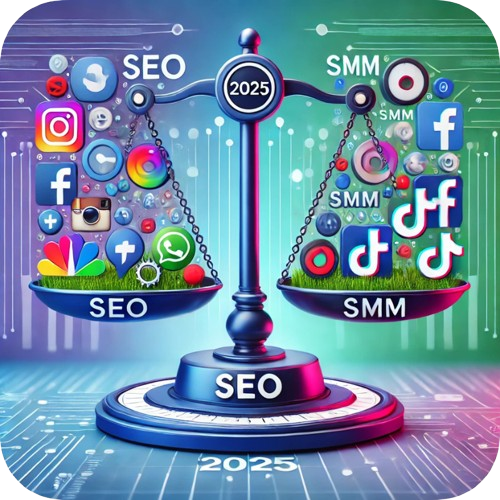Digital Marketing
Last updated: January 2025 RRdigital360 team

SEO vs. SMM: Which is the best strategy for your business in 2025?
Deciding between SEO (Search Engine Optimization) and SMM (Social Media Marketing) for your 2025 marketing strategy is like choosing between chocolate and vanilla ice cream. Each has unique benefits and appeals, but which one will deliver the growth your business needs?
This article will explore the benefits and drawbacks of both approaches, helping you decide which can give your business a competitive edge in 2025. Whether your focus is on increasing traffic, boosting audience engagement, or driving conversions, we’ve got you covered.
What is SEO?
SEO is the process of optimizing your website to achieve better rankings on search engines like Google. It involves strategies such as keyword research, high-quality content creation, and enhancing website performance.
Advantages of SEO:
- Cost-Effective: SEO reduces dependency on paid ads by generating organic traffic.
- Sustained Results: Unlike ads, SEO provides long-term benefits by consistently attracting users.
- Increased Credibility: Higher rankings enhance your brand’s trust and reliability.
What is SMM?
SMM leverages social media platforms like Facebook, Instagram, and Twitter to promote brands, foster audience engagement, and generate website traffic. It’s all about creating content that resonates with your target audience, such as posts, images, videos, and ads.
Advantages of SMM:
- Brand Awareness: Platforms like Instagram and TikTok are excellent for showcasing your brand’s personality.
- Audience Engagement: Tools like polls, Q&A sessions, and live streams allow direct interaction with followers.
- Targeted Advertising: Platforms enable precise targeting based on demographics, interests, and behaviors.
- Influencer Marketing: Collaborating with influencers helps reach larger or niche audiences effectively.
Key Differences Between SEO and SMM
Traffic Generation
- SEO: Brings steady, organic traffic by improving your website’s rankings. According to HubSpot, 75% of users never scroll past the first search results page, highlighting the importance of ranking high.
- SMM: Drives traffic through viral content and promotional posts. A single tweet or viral Instagram Reel can generate massive visits in a short period.
Cost-Effectiveness
- SEO: Requires investment in content and technical improvements but delivers lasting results without ongoing costs.
- SMM: May involve higher costs due to paid advertising and influencer collaborations but delivers immediate visibility.
Engagement
- SEO: Focuses on meeting user search intent and providing relevant content.
- SMM: Builds real-time relationships through likes, comments, and direct messages.
When to Use SEO
Use SEO if your goal is consistent, long-term traffic growth. Here are some trends to prioritize in 2025:
- Optimize for User Intent: Focus on aligning your content with user search queries.
- Mobile-First Indexing: Ensure your website is mobile-friendly.
- Technical SEO: Improve site health by optimizing loading times, using HTTPS, and maintaining clean code.
- High-Quality Content: Publish fresh, detailed, and relevant blog posts frequently.
When to Use SMM
SMM is ideal for:
- Building Brand Awareness: Platforms like Instagram and TikTok allow you to share visually engaging content.
- Boosting Engagement: Interact with followers through comments, polls, and live streams.
- Running Targeted Campaigns: Use advanced targeting options on Facebook and Instagram.
- Collaborating with Influencers: Partner with influencers to expand your reach.
Combining SEO and SMM for Maximum Impact
Instead of choosing between SEO and SMM, why not leverage both? Integrating these strategies can amplify your marketing efforts and create a comprehensive approach.
Tips for Combining SEO and SMM:
- Cross-Promote Content: Share SEO-friendly blog posts on your social media channels to drive traffic and gain backlinks.
- Use SEO Keywords in SMM: Include SEO keywords in your social media posts and hashtags.
- Maintain Consistent Messaging: Align your social media content with your website’s tone and messaging.
- Engage Your Audience: Respond to comments and messages promptly to build loyalty.
- Track Performance: Monitor your strategies using analytics tools and adjust as needed.
Conclusion
So, which strategy is better in 2025: SEO or SMM?
It depends on your business goals. SEO is perfect for generating sustainable, organic traffic, while SMM excels in building brand visibility and engaging audiences. For optimal results, combine both strategies to create a balanced and effective digital marketing approach. By merging SEO’s keyword capabilities with SMM’s connectivity, your brand can achieve a stronger online presence and greater success.
Stick to your brand’s voice, promote your content effectively, and always monitor your results to stay ahead in the digital marketing game.